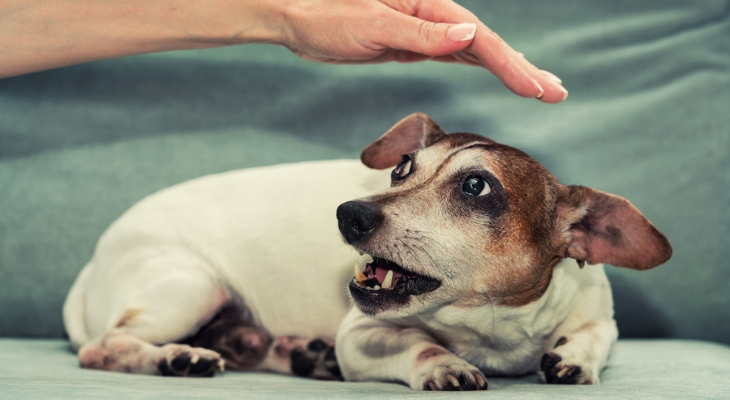
What Causes Stomatitis in Dogs?
Stomatitis could be the reason for your dog's sore mouth. The disease attacks the soft tissues in your pet's mouth, causing painful ulcers. Understanding the cause of this disease will help you protect your furry friend's oral health and reduce your pet's risk for tooth loss.
What Is Stomatitis?
Chronic ulcerative paradental stomatitis (CUPS), commonly called stomatitis, occurs due to inflammation of the mucous membranes in your pet's mouth. The membranes are found in your dog's gums and the lining of the mouth, lips, tongue, and throat. Without proper treatment, stomatitis can destroy the gum tissue that holds your dog's teeth firmly in place, resulting in tooth loss.
Inflammation due to stomatitis causes red, inflamed sores in your pet's mouth. These ulcers often form on the inner surface of the upper lips but may also develop on any tissue that comes in contact with the teeth, like the gums and tongue. Merck Veterinary Manual notes that Greyhounds, Miniature Schnauzers, Labrador Retrievers and Maltese breeds are most likely to be affected by stomatitis. However, any dog can develop the disease.
In addition to the ulcers, other signs and symptoms of stomatitis may include:
- Bad Breath
- Thick Drool
- Pus on the Gums
- Swollen Gums
- Receding Gums
- Bloody Saliva
- Pus on the Mucous Membranes
- Brown Tartar Build-Up on the Teeth
Dogs with stomatitis are more likely to have gingivitis, a mild form of gum disease that occurs due to plaque and bacteria on their teeth. Your pets may also avoid eating, lose weight, and even be reluctant to open their mouths due to pain.
Why Does My Dog Have Stomatitis?
Although it's not always possible to determine the cause of stomatitis, many cases in dogs occur due to an immune system overreaction to the presence of plaque on the teeth, according to Veterinary Practice News. Plaque is a sticky, colorless bacterial film that constantly forms on the teeth.
In people, plaque build-up can cause cavities. Dogs are much less likely to develop cavities, but may develop periodontal (gum) disease as a result of plaque. Eighty to ninety percent of dogs over age 3 have some degree of periodontal disease, according to Cornell University College of Veterinary Medicine.
Plaque eventually hardens into tartar, a hard, brown build-up that often appears at the bottom of teeth or between teeth. The rough surface of tartar provides the perfect place for bacterial growth. Tartar increases your pet's risk for gum disease, but can thankfully be removed by your pet's veterinarian.
How Is Stomatitis Treated?
Treatment starts with a thorough dental cleaning to remove plaque, bacteria, and tartar from your pet's teeth. Cleanings are performed under anesthesia for your dog's comfort. In some cases, it may be necessary to remove teeth that can't be saved.
Your pet may also receive oral or topical antibiotics to kill bacteria or steroids to decrease pain and swelling. Dogs with stomatitis may require more frequent professional cleanings in the future to keep plaque, bacteria, and tartar under control.
Caring for a pet with stomatitis at home can be a little tricky. Your pet will likely need twice-daily home cleanings to prevent plaque build-up, yet may be reluctant to submit to toothbrushing due to pain or previous experiences with mouth pain.
If your pet is in pain, wiping its teeth with special dental wipes may be a better option than brushing. You may also need to use special prescription anti-bacterial rinses or gels to reduce bacteria. Let your veterinarian know if you're struggling to keep your dog's teeth clean. He or she can offer some suggestions that may make the process easier.
Regular dental cleanings are important for all dogs and are crucial for dogs with stomatitis. If it's time for your dog's cleaning, or you're concerned about your pet's oral health, contact our office to schedule an appointment with the veterinarian.
Sources:
Merck Veterinary Manual: Disorders of the Mouth in Dogs, 5/2018
https://www.merckvetmanual.com/dog-owners/digestive-disorders-of-dogs/disorders-of-the-mouth-in-dogs
Veterinary Practice News: Causes of Canine Stomatitis, 6/28/2017
https://www.veterinarypracticenews.com/causes-of-canine-stomatitis/
Cornell University College of Veterinary Medicine: Periodontal Disease
PetMD: Stomatitis in Dogs, 12/23/2022
https://www.petmd.com/dog/conditions/mouth/c_multi_stomatitis



